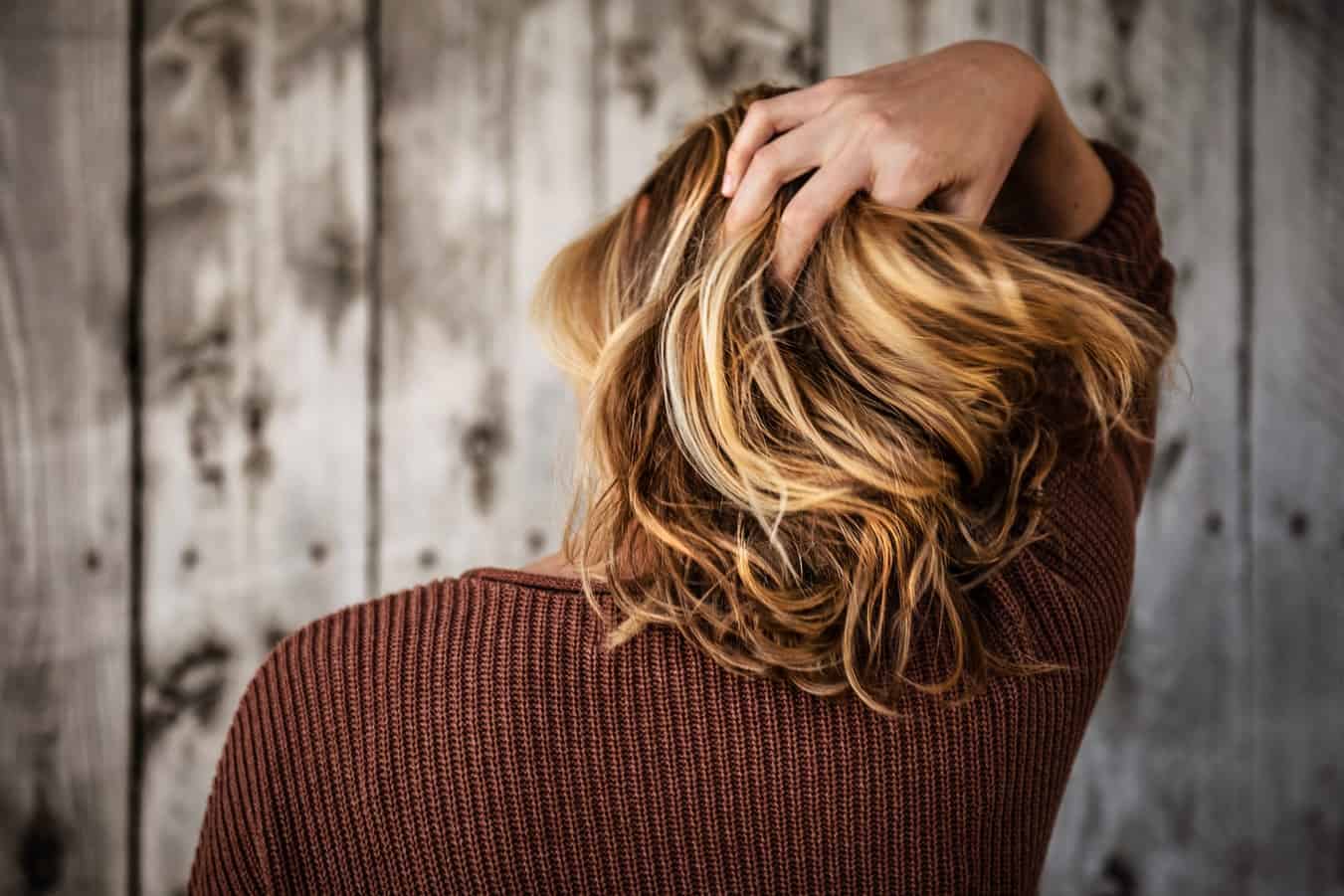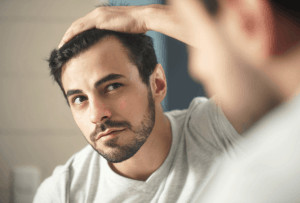Thinning Hair: Causes, Remedies & More!

By the time human beings reach a certain age, whether they be male or female, some physical changes are naturally going to take place. These changes express themselves in different ways. One of the characteristics which both sexes share (to some extent) is the thinning or loss of the hair on one’s head. Thinning hair, as opposed to balding, is something that affects women more than men.
Male and female pattern baldness accounts for the vast majority of hair loss in the U.S. Although companies and researchers are trying their best to figure out a solution, millions of people wake up every day to an unhappy head of hair, which in turn could lead to an unhappy individual. It might be natural, but it is still a difficult process to undergo. People may have a hard time with this transition or condition. A luscious head of hair has always been a sign of youth and beauty.
But, there is a difference between thin hair as a hair type, and hair which is thinning due to a medical condition or aging.
Thick Vs Thin Hair Explained

Woman with healthy hair.
Thick and thin hair refers, generally speaking, to the thickness of a single hair strand on a person’s head. If a standard hair strand’s width is higher than the average (0.06-0.08mm), it’s thick. The thickness of hair does not refer to the fullness of one’s head of hair. That aspect has to do with the density of the hairs and with their sheer numbers. Though sometimes these terms are used interchangeably, “thick” and “full” are not the same thing. You can have a full head of thin hair, and there is nothing contradictory or odd about it.
Thick and thin hair are both equally at risk of thinning out and/or being shed. Some amount of hair is shed naturally throughout the day, roughly between 50 to 100 hairs. Depending on the case, the body may continue to sprout new hairs from the follicles which had shrunk and receded. This is all part of the natural cycle of hair growth. Sometimes, however, after a hair strand has been shed, the follicle has difficulties functioning and will cease to produce new hairs.
Over time, there may be noticeable thinning. This post is going to address that issue, and attempt to break down the causes and sought-after solutions to the problem of hair loss and hair thinning in particular.
Why Is My Hair Thinning?
Pattern baldness is the most prevalent reason for male and female hair loss. Whether it manifests as thinning or balding, the volume of one’s hair may begin to show signs of reduction. Some notice it sooner than later, and some are more bothered by it than others. Overall, it is a difficult situation to deal with. You feel like your body is betraying you. In some cases, there is nothing you can do about it. On the one hand, it’s hair; but on the other hand, that’s enough to make some people feel seriously helpless and lost.
Thinning hair could be the result of genetic predisposition, or it could be the result of some kind of trigger. Many different factors come to play in the thinning of one’s hair. Understanding the probable causes behind it could very well be the thing that allows you to combat it. The stats are not in anyone’s favor though, particularly if you are male. However, science is making progress in that area with each passing year and with each new discovery.
There is no harm in being cautiously optimistic. Nevertheless, as of now, there is no guaranteed or permanent solution to the problem of hair loss and/or thinning. However, there are some causes to pinpoint.
Hair Thinning Causes Explained

Man checking his hair in the mirror.
There are over 20 kinds of hair loss-related conditions. Some of them are predetermined. Some of them are altogether avoidable. It’s all about how you treat your hair and how you treat your body. It has to do with your environment, the food on your plate, the drink in your glass, and even your mental state. These can all contribute to the hair thinning out and reducing the volume of your head of hair.
Vitamin deficiencies, age-related “wear and tear”, crash diets, traumatic events, depression. These could all play a role in why your hair is suddenly behaving in ways which, until now, have not been part of your day-to-day experience. Some people are really crushed when they look at their pillow or shower drain in the morning, and see that they are shedding more often and in greater numbers. It becomes even worse when the person realizes that the hairs are not growing back, as they once did.
There is the prevailing and ever-present idea of cause and effect. This principle of causality is something which is not always made too clear. You can’t always precisely pinpoint how A led to B which led to C. When it comes to hair thinning and hair loss this is certainly true. By the time you start to notice it, it might already be game over. Again, this is largely the case with men more than it is with women.
Causes Of Thinning Hair In Women
Like men, some of the reasons for hair loss can be purely related to genetics. With each new turn of the follicle’s natural cycle, more and more of them gradually cease to function normally. As a result, you do not produce new hairs, and this expresses itself as hair loss. If you have a family history of baldness, it may just be in your future. Although there’s no guarantee one way or the other.
And then there is the reactive type of hair loss, which one’s physical or mental state often triggers. Anything from dieting to overly-tight hairdos to hormonal imbalance could be the cause of a woman’s hair thinning out. There is also the mental factor. Stress and anxiety are able to cause a massive shift in the body’s ability to produce healthy new hairs.
In women, most of the hair thinning occurs on the crown of the head. It’s usually not outright balding so much as it is a reduction in the volume of hair. This often creates a noticeable change in the hair’s appearance. This has the potential to have a serious effect on self-image, self-esteem, and behavior in general. Whether you’re a man or a woman, losing one’s hair can honestly feel like you are losing a part of yourself.
The hormone component is more serious and somewhat unexpected when it comes to women. For the men, it’s seen as a feat if a guy manages to not lose his hair by the time he is in his 40’s or 50’s. Say what you want about the merit of external appearances or lack of it. It matters to a lot of people, maybe more than it ought to. Not a question of judgement, just of society’s standards, and thinning hair could seem detrimental to some people. On the other hand, take a look at the Gray Granny hair trend which is still ongoing – who woulda thought it would take?
Thinning Hair Remedies Breakdown

Nutrient hair thickening supplements.
When it comes to fixing the situation, it is important to get a proper diagnosis by a medical doctor. Again, knowing the reasons behind the hair’s behavior could prove to be a turning point in the way that you approach the issue, and in the way you see yourself.
Some remedies for hair thinning even have FDA approval. Also as important for fixing the condition, is being real with yourself regarding your expectations. With women, there is a much higher chance of regrowing new hair and retaining hair which is healthy. That said, it’s important to be realistic and understand that things may not be the same going forward. With items like Rogaine or Propecia, the person must continue the hair-growth treatment, lest the condition returns to its previous state.
Other remedies are available. Depending on the individual and their subjective experience, these other remedies may provide an answer (or partial answer) to the question of thinning hair. These can be as simple as a scalp massage coupled with essential oils. Alternatively, it could be as complex as a professional hair transplant procedure spanning weeks, or even months, of your life.
Remedies for thinning hair may be useful, but then their usefulness may run its course. It’s not always possible to tell how your scalp and roots will be affected, but if you find something that works for you, certainly consider continuing to use it.
If you develop any other conditions or symptoms, consult with your physician. Hair is only worth so much, after all, and you probably don’t want to ignore other symptoms or signs of different kinds. Losing hair can be a dangerous sign in and of itself if it is accompanied by other signals your body might be sending you.
Vitamins For Thinning Hair

Slices of toast with healthy vitamin-rich toppings.
Vitamins are a big part of hair care and self-care in general. These essential nutrients encourage the proper growth of hair, and the healthy development of hair follicles. Certain vitamins (A, B, C, D, and E) are typically singled out as being crucial for proper hair growth, and a vitamin deficiency could indeed be the cause for hair thinning out. The science and research doesn’t point to any single vitamin which is in charge of faster, longer, or thicker growth of human hair, nor the lack of it.
A host of hair growth multivitamins are available for purchase, or alternatively you could choose to increase your vitamin intake by consuming the right kinds of food. Biotin (aka vitamin B7 or vitamin H) has been championed as a savior of hair since the 1990’s. However, no cut-and-dry clinical evidence has linked it to significant improvement in healthy hair growth. Not to say that it couldn’t help – far from it – but there is no one vitamin that can magically increase your hair count or your hair follicles’ strength.
Getting the proper amounts of all your vitamins is the absolute best way to ensure that your hair stays happy and healthy. This is true to kids and adults, men and women. And to be clear, it isn’t only about those vitamins which were singled out. There are 13 essential vitamins which we require, and it is highly recommended to be getting enough of them at all times.
Ultimately, vitamins are essential for so much more than hair growth. They keep the body and mind in good shape; and having healthy, shiny, strong hair strands are a part of that. Your body knows what to do with all of the nutrients you provide it with. It knows how to turn food and drink into energy, and how to get all of the body’s different tissues to be as pristine as can be.
Despite the fact that hair care companies put more emphasis on certain vitamins or groups, a person should strive to get hold of them all. If a certain product, like a shampoo or supplement, can help you acquire something you might be deficient in – go for it. Talk to your doctor if you feel you may be lacking anything in your body. Also, speak to them if you want to get more of a certain vitamin. See what your options are!
Hair Products For Thin Hair

Using natural hair products keeps your scalp healthy.
Alongside proper preventative care and healthy dieting, there are different hair products for those suffering from thinning hair or thin hair. Some work to strengthen the existing hair strands and others are for revitalizing stagnant hair follicles. As for thin hair as a hair type, there are products geared towards adding volume to your hair: ordinary shampoos, dry shampoos, different scalp treatments, and root tonics, which are all meant to add texture and volume to fine hair.
In this category, you will find the same types of products that were mentioned for hair loss. Vitamins, essential oils, massages, and similar solutions. The treatment all comes back to your roots, since that is the part of the hair that is actually still alive. Locks of hair are essentially dead strands of keratin, mostly. It’s the root of the hair which requires the most attention. Of course, there are ways to make the hair appear thicker and more voluminous. However, this is usually more of a symptomatic fix than a viable long-term solution.
As for thinning hair I mentioned earlier that science is working on solutions to these issues. Based on the speed in which things are moving, and the direction in which they are heading, it is probably only a matter of time before we are able to regrow real hair – even if the follicles themselves have been totally eradicated, life finds a way. Don’t ask me how it will happen, since I am not versed in the details of genetic manipulation. Suffice to say I have a good feeling about what science will be able to achieve in this matter.
A lot of money is being poured into this research. This is largely because it is an issue that affects the vast majority of the population. I am only a layperson, but I think that a breakthrough is just around the corner. True, this has been said before, but I, for one, am feeling good about being cautiously optimistic. I know so many people who are desperately waiting for a product that will be able to provide them with some alternative.
Conclusion
Whether you’re looking to thicken your thin hair, or seeking ways to combat your thinning head of hair, there are measures you can take. There is nothing that guarantees success at either one of these endeavors, seeing as how it is such a biological human proclivity. The rule of thumb is that you ought to be providing your scalp and hair with the ways and means to develop properly.
You can choose to alter your diet, or give some new product a shot, or consider therapy to deal with any stress and anxiety you may be feeling. Whatever the case may be, there are all kinds of solutions available. With women, there is a much higher rate of success at revitalizing the hair follicles. With men, it is a different story altogether.
Consult with your physician, whether the issue is thin or thinning hair. You don’t necessarily need to follow the recommended mainstream medication. However, it is always best to know what’s currently on the market. Obviously, it is also a question of convenience, price, and commitment. Not everyone will be able to keep up with a routine, so honestly, it may not be worth your time, energy, and money.
Shampoos, conditioners, treatments, and the like – they could do a lot, or they could do literally nothing. Either way, you choose to go about it, remember that patience is key and that there is no such thing as an overnight transformation. Even hair transplants – generally considered to be beneficial and satisfying with a high success rate – require months of adjustment and extra care, long after the process is completed.

